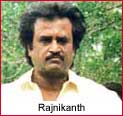Chennai readies for star wars
Rajitha
The best guess, from industry-watchers, is that the situation could explode into a strike that could end up crippling the Kodambakkam film industry.
It all began innocently enough, with the film producer's body getting together to figure out ways and means of putting a cap on the mounting costs attached to film-making.
 Chairing the meeting was newly elected president of the Producers Association, Ibrahim Rowther. Present were vice-presidents Kovai Thambi and A L Azhakappan, and secretaries Chitra Lakshmanan and Anbalaya Prabhakaran.
Chairing the meeting was newly elected president of the Producers Association, Ibrahim Rowther. Present were vice-presidents Kovai Thambi and A L Azhakappan, and secretaries Chitra Lakshmanan and Anbalaya Prabhakaran.
What resulted, was a charter of demands, the main items of which read as follows:
1. The story, screenplay and dialogues have to be finalised before the shooting begins. There can be no 'story sessions' at expensive resorts and five-star hotels, in between shooting schedules. It is the director's responsibility to ensure this.
2. Films have to be canned in a maximum of 60 days shooting time, and use a maximum of 60 rolls of film. If either of these conditions cannot be met, prior permission has to be obtained, by the director, from the producers's body. A codicil to this clause states that those directors who have a track record of success with big-budget megam movies are exempt from this clause, on condition that they have, in the past, established a record of selling their films for Rs 5 crore, or more.
3. Directors will not be allowed to claim car allowance, petrol allowance, driver's wages, cigarettes, liquor and suchlike expenses during the shooting.
4. Directors and stars will not be allowed to use cellphones while a schedule is in progress. Interestingly, the producers have stated that Rajnikanth, Kamal Hassan, Vijaykanth, Ajit, and Vijay are exempt from this clause.
 5. Since it is noticed that stars tend to hire expensive designers for their costumes, the responsibility for picking costumes and jewellery will henceforth be shared by the director, and the costume designer. These two will be responsible for all costumes, producers will not pay for designers hired by the stars.
5. Since it is noticed that stars tend to hire expensive designers for their costumes, the responsibility for picking costumes and jewellery will henceforth be shared by the director, and the costume designer. These two will be responsible for all costumes, producers will not pay for designers hired by the stars.
6. In cases where many extras are required for a scene, or many dancers required for a song sequence, the directors are asked to ensure that the scenes involving these extras are completed first. This is to ensure that extras are not hired and end up hanging around, waiting for the stars to finish their shots before the group scenes are canned.
7. Producers believe that much money is being wasted on putting up debutant stars, especially the imports from Bollywood, in five star hotels. Henceforth, only three star accommodation will be permitted for such starlets, male or female.
8. Leading comedians such as Vivek and Vadivelu do not sign on for movies -- their rates are fixed per callsheet. This, the producers believe, has created a situation where they end up paying the comedians more than they pay the stars.
There is more, but these are essentially the high points of the producers' charter of demands.
 Interestingly, the Directors Association (president: Bharatiraja; secretary: R K Selvamani; Treasurer: V Shekar) immediately accepted the charter of demands, in toto and without any bargaining.
Interestingly, the Directors Association (president: Bharatiraja; secretary: R K Selvamani; Treasurer: V Shekar) immediately accepted the charter of demands, in toto and without any bargaining.
Following this, the Producers Association called a press conference and released details of their demands -- and in the process, lit the fuse of what threatens to develop into an explosive situation.
The Artistes Association has scheduled a meeting for month-end, to discuss the producers' demands and respond. However, the fact that they are unhappy, and in no mood to accept, is already becoming clear.
In private, various stars we spoke to voiced their opposition to the producers's demands. The main objections, garnered through conversations with various stars, male and female, are as follows:
1. Why, it is asked, did the producers feel the need to go to the press, and thereby to the public, with their demands before submitting it to the Artistes Association? This, the stars believe, has created the feeling that the stars are a bunch of greedy, money-grubbing looking to make merry at the expense of the producers.
 2. Why, it is asked, are some stars exempt from the cellphone ban? For instance, they point to the case of Vijaykanth. Granting, they argue, that he is both a leading star and the head of the artistes' body and therefore entitled to some concession, why then is Sharath Kumar, who is vice-president of the Artistes Association, not treated on par? This, stars argue, is symptomatic of the producers' attempt to divide, and rule.
2. Why, it is asked, are some stars exempt from the cellphone ban? For instance, they point to the case of Vijaykanth. Granting, they argue, that he is both a leading star and the head of the artistes' body and therefore entitled to some concession, why then is Sharath Kumar, who is vice-president of the Artistes Association, not treated on par? This, stars argue, is symptomatic of the producers' attempt to divide, and rule.
3. Why, the stars ask, are they the ones who have to bear the brunt of the cost-cutting exercise? Why, they demand, are producers content to foot the bill for expensive song-sequences in foreign locales, when they can as easily be shot in India? Why are the producers willing to pay for the enormous destruction that occurs during stunt sequences, when expensive sets and costly cars are blown up? Why has cost-cutting not been applied to such areas?
All this could be passed off as the grumblings of disgruntled stars. The real bombshell, though, was delivered by Vijaykanth, wearing the hat of president, Artistes Association.
In a response to the producers's charter of demands, Vijaykanth pointed out that stars have been bending over backwards in terms of accepting remuneration from producers. On occasion, when the film has faced financial difficulties, stars have even waived their payments until the film is completed, and sold.
An instance in point that is cited (this did not, it must be mentioned, come from Vijaykanth) relates to Jyotika, now ruling the roost in Chennai. When she was a newcomer to the industry, K B Films had signed her on to star in the banner's next venture, Nanba.
The remuneration offered at the time was Rs 3 lakh, in keeping with her newbie status.
 However, two years and more have passed since that signing. The film was stalled for various reasons. In the interim, Jyotika came up with hit after hit, and is now on par with Simran as the most highly paid female star in Tamil films, commanding a wage of Rs 25-plus lakh per film.
However, two years and more have passed since that signing. The film was stalled for various reasons. In the interim, Jyotika came up with hit after hit, and is now on par with Simran as the most highly paid female star in Tamil films, commanding a wage of Rs 25-plus lakh per film.
Two months ago, K B Films found itself in a position to revive its stalled project. Problem was, they needed Jyotika's dates all over again. And began worrying about whether she would now need to be paid at her current rates.
Jyotika, hearing of the producer's dilemma from third parties, voluntarily called him up and offered to work for the film at the originally agreed price.
Stars point out that they have been very accommodating towards producers in the past. It is this that Vijaykanth threatens to change. If the producers are obdurate, the stars will come up with their own demands. And these will include:
1. The entire salary and perks have to be agreed upon, and spelt out in the agreement, at the time of signing for the film. If for any reason a film is stalled and cannot be completed, the stars will not, here on in, be liable to return the signing amount.
2. Payments will not, any longer, be ad hoc. Ten per cent of the agreed-upon fee has to be paid at the time of signing for the film; a further 40 per cent when shooting is complete; and the balance as soon as the star completes dubbing. The stars will not, any more, be willing to wait till the film is sold, and released, before taking their money from the producers.
 The tough stance came as a surprise to the producers. What added piquancy to the situation was that the stance was spelt out by Vijaykanth, to Ibrahim Rowther. Reason being, Vijaykanth and Rowther are close friends, with the latter having produced quite a few of the films starring the former.
The tough stance came as a surprise to the producers. What added piquancy to the situation was that the stance was spelt out by Vijaykanth, to Ibrahim Rowther. Reason being, Vijaykanth and Rowther are close friends, with the latter having produced quite a few of the films starring the former.
In their turn, the producers now say while they will wait for the artistes to spell out their stance in detail, they will not be cowed down by the tough stance the artistes are taking on the issue. Thus, a big-time producer argued that the stars would be asked to return their signing amounts in case a film doesn't make it to the floors -- and if this demand is rejected by the stars, then producers would simply stop bankrolling films, period.
Which is where we leave the story now -- in the film industry's version of a Mexican Standoff. The next chapter of this potentially explosive tale is likely to be written on November 29, when the Artistes Association meets to discuss the producers's demands in detail and formulate their own response.